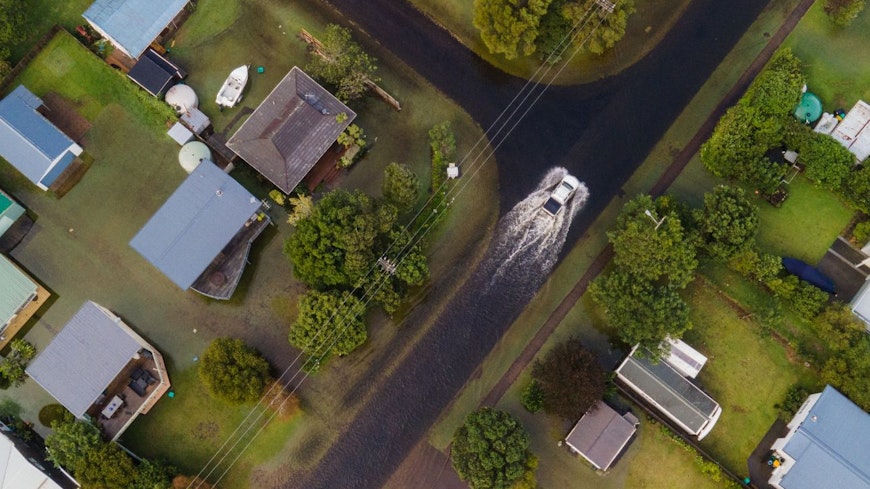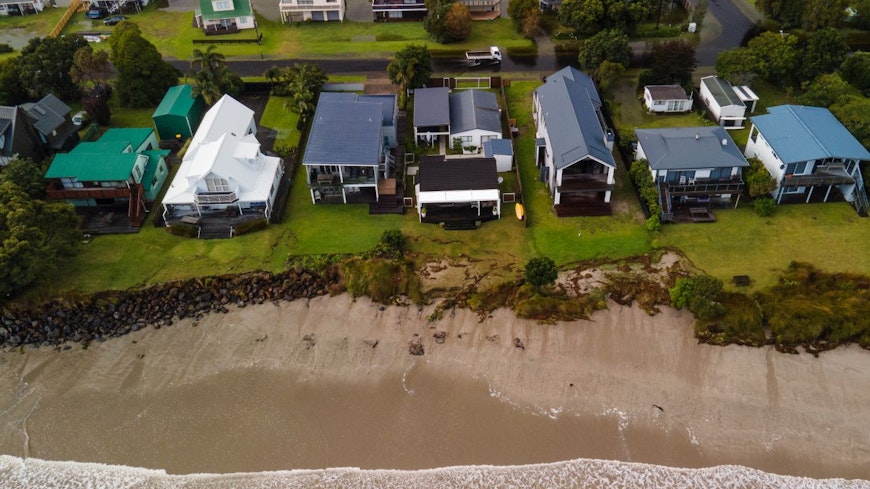
By Rebecca Styles
Research Lead | Hautū Rangahau
Peter* and his wife were visiting his grandchildren in Perth when Cyclone Gabrielle tore through the Hawke’s Bay on Valentine’s Day 2023.
“It was 5am and we were watching it on the news going holy hell.”
Thankfully the couple had house sitters in their semi-rural property who were able to rescue Peter’s mother-in-law who lives in a cottage beside the house.
While everyone was safe, there was extensive damage to the property, which includes their home and two small commercial activities – an orchard and an arborist.
Five days after the cyclone, Peter was back home assessing the damage. If he had been home at the time, he would’ve put some things up higher, out of harm’s way. Otherwise, there wasn’t much he could have done.
When we spoke to Peter, 10 months after the cyclone, he was still waiting to hear about the outcome of his house insurance claim.
Three different assessors and three contractors from the insurance company visited the property, and by the time he was finally offered a settlement, it was based on the wrong assessment.
“It’s like the left hand doesn’t know what the right hand is doing,” he said.
In Consumer NZ’s 2023 insurance satisfaction survey we asked people whether they had made an insurance claim as a result of the Auckland Anniversary Weekend floods or Cyclone Gabrielle.
We wanted to know how the claims process went for them, particularly for house insurance claims.
We found insurers have some work to do to improve communication with customers during the claims process.

Flooding along the Coromandel Peninsula, New Zealand after Cyclone Gabrielle
Communication lacking from insurers
We had 47 responses from people who made a claim from the Auckland event, and another 37 from Cyclone Gabrielle (nine people put in a claim for both events). While this is a fraction of the number of claims lodged, we think it provides a useful snapshot of the claims experience.
Overall, our respondents were very satisfied with the fairness of the settlements they received, and the ease of lodging their claims. It was the steps in between that were problematic.
We spoke to Mark whose recently renovated home in Mt Eden was flooded when a stormwater drain near his property overflowed during the Auckland Anniversary Weekend flood. His car was also flooded.
“Making a claim online, was positive, you know, I got a claim number, and I knew I was in the system,” said Mark.
While his claims for the car and contents went smoothly, it was a different story with the house insurance claim.
After he lodged the claim, a loss adjustor came to the property; but “from then on it went downhill … in the previous claims I was actually talking to a person at the insurance company, and then it deferred to email communications only, and the person at the insurer would change and go offline for a couple of weeks and then someone new would pick it up, clearly inexperienced and not really able to communicate.
“In my opinion it took a lot longer than it should have to go through that process.”
Mark had quotes from his recent renovations, so it was relatively easy to put estimates in. He also paid to strip and reline the walls of the house before the settlement came through, which was a leap of faith.
“There was no one giving you reassurance that you had a valid claim,” he said.
“There was a long period of no communication, and I ended up making a formal complaint just to get some communication going again.”
Mark did end up getting a financial settlement.
Mark’s experience isn’t an isolated case. Most of the respondents to our survey were dissatisfied with the claims process. They didn’t feel they were kept informed about their claims’ progress and were dissatisfied with the speed claims were dealt with.
People were also dissatisfied with the level of knowledge and help they received from their insurers.
Many respondents were dissatisfied with the claims process
Many respondents were dissatisfied with how insurers kept them informed during the claims process
Many respondents were dissatisfied with the speed of the claims process
Many respondents were very satisfied with the fairness of the settlement
Our survey took place online in October 2023. Respondents rated their experiences out of 10, with their scores grouped to the scale: dissatisfied (0-4), neutral (5), somewhat satisfied (6-7), very satisfied (8-10).
How long does it take to process a claim?
We asked the insurers how long it took, on average, for a house and contents claim to be settled in the 12 months from 1 September 2022 to 31 August 2023.
Tower and Trade Me said a house claim took on average 92 days, and a contents claim 61 days to be completely settled.
Steve Wilson, the Chief Claims Officer for Tower, said claims that require specialist engineers, building consents or have EQC components can take longer to settle.
For FMG, a house claim took on average 36 days, while contents took 22 days to be accepted (the step before final settlement).
MAS said the information wasn’t available.
AA Insurance said it’s difficult to provide an average due to the varying complexity of claims. Claims for single items, like a mobile phone or replacement television, could be processed within 5 working days. More extensive damage to land and homes, “can be many weeks and sometimes much longer if the claim is particularly complex”.
All EQC claims, for damage caused by a natural disaster, are also now administered by people’s private insurers. AA Insurance, FMG and Tower said that having one point of contact makes for a better customer experience.
AA Insurance said it had handled over 800 EQCover claims after the two extreme weather events. These claims can be complex and “often take longer to settle as they require additional expertise including building assessments and geotechnical experts,” a spokesperson said.
The people we spoke to for this story, and the results of our survey, suggest it takes months – even up to a year – rather than days to reach a final settlement for a house insurance claim after an extreme weather event.
In December 2023, the Insurance Council of New Zealand (ICNZ) said 87% of the claims from the North Island weather events had been settled.
ICNZ said the two events “are separately the two largest insurance weather events in Aotearoa’s history.”
Insurers brought in staff from overseas, and staff from all over the business, who initially worked through the weekends to get through the lodged claims. Claims were triaged on the basis of damage, habitability and vulnerability. Once lodged, claims are sent to third parties to carry out assessments.
Over 80,000 claims for house and contents insurance were received from the events. More contents insurance (94%) than house insurance claims (85%) have been settled.
“We know some homeowners are waiting to settle until more is known about their local council voluntary buyout offer,” Tim Grafton, the Chief Executive of the ICNZ said.
He urged people to wait for the insurer to finalise their claim.
“Insurers are committed to finalising the remaining claims with their customers,” Grafton said.

Cooks Beach, Coromandel Peninsula after Cyclone Gabrielle in New Zealand
The impact of disaster claims on premiums
Mark, whose Mt Eden house was flooded, was also concerned about the impact the flood would have on premiums.
“I’m bracing myself to get my premium letter in the mail,” he said.
Our annual insurance satisfaction survey found that over 60% of respondents were concerned about the cost of house insurance, while 52% were worried about the cost of contents insurance.
These concerns are warranted. Consumer’s 2023 insurance premium survey found that house and contents insurance premiums have gone up by 28% for a large house in Auckland, and by 26% for a standard house.
To find out how much premium prices have increased in other centres, and for tips to help reduce your premium, see our house and contents insurance buying guide.
Mark also pointed out that his house got damaged because of a council infrastructure failure and questioned the role of the council in the insurance equation.
“It’s hard to separate out the role of insurance and the council here a little bit … the council and the lack of maintenance contributed to it.”
Belinda Storey is an expert in climate risk and how it relates to insurance. She explained how councils have a role in mitigating risk.
“Insurance costs are based on hazards and your exposure to [them], and how vulnerable you are to damage,” Storey said.
From a global perspective, slowing down climate change will reduce hazards. But from a local perspective, it’s about councils helping communities get out of the way of the hazards, or making sure properties have some protection.
To this end, some councils are putting in risk-reduction measures – like stop banks. Storey said these measures are better referred to as “risk suppression”.
“Unless you are getting out of the way of the water on a permanent basis, you are suppressing the risk – it’s a temporary measure,” she said.
Suppressing the risk by putting up a stop bank can also generate its own risks. If water comes over the bank, it can come very quickly – essentially like a dam breaking – whereas in a normal flood event, residents can see the water coming and have more time to get out. Risk suppression can end up being a risk to life.
After the extreme weather events in early 2023, some councils are also looking at risk suppression, Storey said. Others, such as Auckland Council, are “more willing to move directly into buyouts” as a more permanent solution to reducing risk.
Bigger councils have more resources to analyse risk and buy out properties, and deeper pockets to respond to legal actions if a developer challenges climate-change mitigations, Storey said.
“Those developer challenges are likely to increase with the change of government … they want to open up more land for development, as opposed to building upwards. Those developments could be a long distance from city centres or in locations that have had hazardous events in the past because they are cheaper.”
Yet, until local and central government can effectively mitigate the impacts of climate change, consumers are stuck in the middle paying more and more to protect their homes.
Where to get help with your insurance claim
Aotearoa New Zealand insurers have signed up to a Fair Insurance Code. The code gives timelines for communication and requires transparency when insurers are processing claims.
In a disaster, the timelines may not be doable, but the code requires insurers to “respond as quickly as possible and in a professional, practical, and compassionate manner.”
If you’re not getting a response from your insurer, or you’re not happy with the response you get, there are things you can do.
First, make a formal complaint with your insurance company.
If you can’t reach an agreement after making a formal complaint, you can then make a complaint to the dispute resolution scheme your insurer has signed up to. The two main schemes are the Financial Services Complaints or the Insurance and Financial Services Ombudsman.
If your claim results from a natural disaster, the NZ Claims Resolution Service has been set up to help. You can contact the service on nzcrs.govt.nz or call 0508 624 327.
*Name changed to protect privacy.



